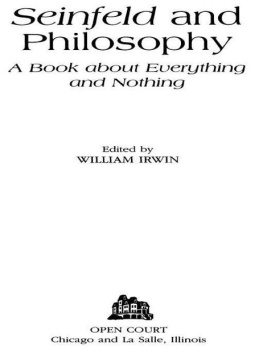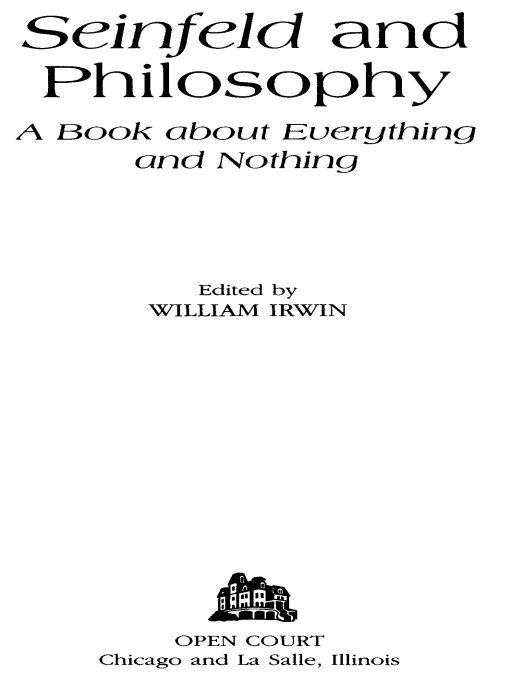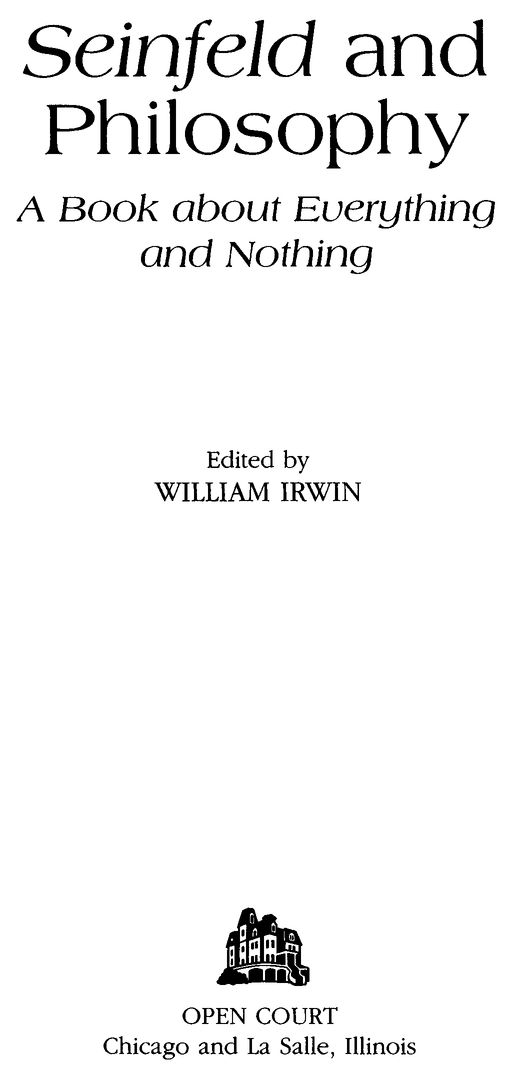Table of Contents
Popular Culture and Philosophy Series Editor: George A. Reisch
VOLUME 1
Seinfeld and Philosophy: A Book about Everything and Nothing (2000)
VOLUME 2
The Simpsons and Philosophy The Dob! of Homer (2001)
VOLUME 3
The Matrix and Philosophy: Welcome to the Desert of the Real (2002)
VOLUME 4
Buffy the Vampire Slayer and Philosophy: Fear and Trembling in Sunnydale (2003)
VOLUME 5
The Lord of the Rings and Philosophy: One Book to Rule Them All (2003)
VOLUME 6
Baseball and Philosophy: Thinking Outside the Batters Box (2004)
VOLUME 9
Harry Potter and Philosophy: If Aristotle Ran Hogwarts (2004)
VOLUME 12
Star Wars and Philosophy: More Powerful than You Can Possibly Imagine (2005)
VOLUME 13
Superheroes and Philosophy: Truth, justice, and the Socratic Way (2005)
VOLUME 15
The Chronicles of Narnia and Philosophy: The Lion, the Witch, and the Worldview (2005)
VOLUME 17
Bob Dylan and Philosophy: Its Alright Ma (Im Only Thinking) (2006)
VOLUME 18
Harley Davidson and Philosophy: Full-Throttle Aristotle (2006)
VOLUME 19
Monty Python and Philosophy: Nudge Nudge, Think Think! (2006)
VOLUME 20
Poker and Philosophy: Pocket Rockets and Philosopher Kings (2006) Edited by Eric Bronson
VOLUME 21
U2 and Philosophy: How to Decipher an Atomic Band (2006)
VOLUME 22
The Undead and Philosophy: Chicken Soup for the Soulless (2006)
VOLUME 23
James Bond and Philosophy: Questions Are Forever (2006)
VOLUME 24
Bullshit and Philosophy: Guaranteed to Get Perfect Results Every Time (2006)
VOLUME 25
The Beatles and Philosophy: Nothing You Can Think that Cant Be Thunk (2006)
VOLUME 26
South Park and Philosophy: Bigger Longer, and More Penetrating (2007) Edited by Richard Hanley
VOLUME 27
Hitchcock and Philosophy: Dial M for Metaphysics (2007) Edited by David Baggett and William A. Drumin
VOLUME 28
The Grateful Dead and Philosophy: Getting Higb Minded about Love and Haigbt (2007) Edited by Steven Gimbel
VOLUME 29
Quentin Tarantino and Pbilosopby: How to Pbilosopbize with a Pair of Pliers and a Blowtorch (2007) Edited by Richard Greene and K. Silem Mohammad
VOLUME 30
Pink Floyd and Philosophy: Careful with that Axiom, Eugene! (2007) Edited by George A. Reisch
VOLUME 31
Johnny Casb and Philosophy: The Burning Ring of Truth (2008) Edited by John Huss and David Werther
VOLUME 32
Bruce Springsteen and Philosopby: Darkness on the Edge of Truth (2008) Edited by Randall E. Auxier and Doug Anderson
VOLUME 33
Battlestar Galactica and Philosophy: Mission Accomplished or Mission Frakked Up? (2008) Edited by Josef Steiff and Tristan D. Tamplin
VOLUME 34
iPod and Pbilosopby: icon of an ePoch (2008) Edited by D.E. Wittkower
VOLUME 35
Star Trek and Philosopby The Wrath of Kant (2008) Edited by Jason T. Eberl and Kevin S. Decker
VOLUME 36
The Legend of Zelda and Philosophy I Link Therefore I Am (2008) Edited by Luke Cuddy
VOLUME 37
The Wizard of Oz and Philosophy: Wicked Wisdom of the West (2008) Edited by Randall E. Auxier and Phillip S. Seng
VOLUME 38
Radiohead and Philosophy: Fitter Happier More Deductive (2009) Edited by Brandon W. Forbes and George A. Reisch
VOLUME 39
Jimmy Buffett and Philosopby The Porpoise Driven Life (2009) Edited by Erin McKenna and Scott L. Pratt
VOLUME 40
Transformers and Philosophy (2009) Edited by John Shook and Liz Stillwaggon Swan
VOLUME 41
Stephen Colbert and Philosophy: I Am Philosophy (And So Can You!) (2009) Edited by Aaron Allen Schiller
VOLUME 42
Supervillains and Philosopby: Sometimes, Evil Is Its Own Reward (2009) Edited by Ben Dyer
VOLUME 43
The Golden Compass and Philosophy: God Bites the Dust (2009) Edited by Richard Greene and Rachel Robison
VOLUME 44
Led Zeppelin and Philosopby: All Will Be Revealed (2009) Edited by Scott Calef
VOLUME 45
World of Warcraft and Philosophy: Wrath of the Philosopher King (2009) Edited by Luke Cuddy and John Nordlinger
VOLUME 46
Mr. Monk and Philosophy (2010) Edited by D.E. Wittkower
IN PREPARATION:
Anime and Philosophy (2010) Edited by Josef Steiff and Tristan Tamplin
Zombies, Vampires, and Philosophy (2010) Edited by Richard Greene and K. Silem Mohammad
Facebook and Philosophy (2010) Edited by D.E. Wittkower
Soccer and Philosopby (2010) Edited by Ted Richards
Manga and Philosophy (2010) Edited by Josef Steiff and Adam Barkman
The Red Sox and Philosophy (2010) Edited by Michael Macomber
The Onion and Philosophy (2010) Edited by Sharon M. Kaye
For full details of all Popular Culture and Philosophy books, visit www.opencourtbooks.com.
Dedicated to Bob Sacamano
Preface
The writing, editing, and other miscellaneous tasks involved in assembling Seinfeld and Philosophy: A Book about Everything and Nothing were a terrific and unparalleled experience. Each of the contributors was a consummate professional, working hard, paying diligent attention to details, and keeping a sense of humor throughout. The good folks at Open Court, David Ramsay Steele in particular, were a pleasure to work with, and are to be thanked and congratulated for having the fortitude, vision, and sense of humor to publish this volume.
In addition to the contributors and the publisher I wish to thank all those with whom I have discussed the connections between philosophy and Seinfeld. Many of these individuals took the time to read drafts of early versions of the essays in this book, offering valuable comments and criticisms which no doubt improved the final product. A list such as this is inevitably incomplete, but among those to whom I am indebted are: Gregory Bassham, Derrick Boucher, Alan Clune, Jason Goodman, Robert Guldner, Kathleen Irwin, Mary Ellen Irwin, William N. Irwin, Megan Lloyd, JR Lombardo, Jennifer ONeill, Marc Marchese, Troy Marziotti, Henry Nardone, Joseph Schmidt, Kate Williams, all members of the original Buffalo Rectangle, and my colleagues and students at Kings College.
Monologue
Seinfeld,The Field of Being
WILLIAM IRWIN
Why a book on philosophy and Seinfeld? How can philosophy, the discipline which is a more or less general theory of everything deal with a show which claims to be about nothing? Well, allow me to suggest that everything and nothing are sometimes not so terribly far apart. To put it more correctly, the nothing that Seinfeld deals with is most definitely something, something at times philosophical. The most popular sitcom of the 1990s managed to draw lifes everyday events to our attention in a way not often done before, highlighting the commonplace and mundane, drawing our attention to things that would otherwise go unnoticed. Socrates told us that the unexamined life is not worth living. The characters on











